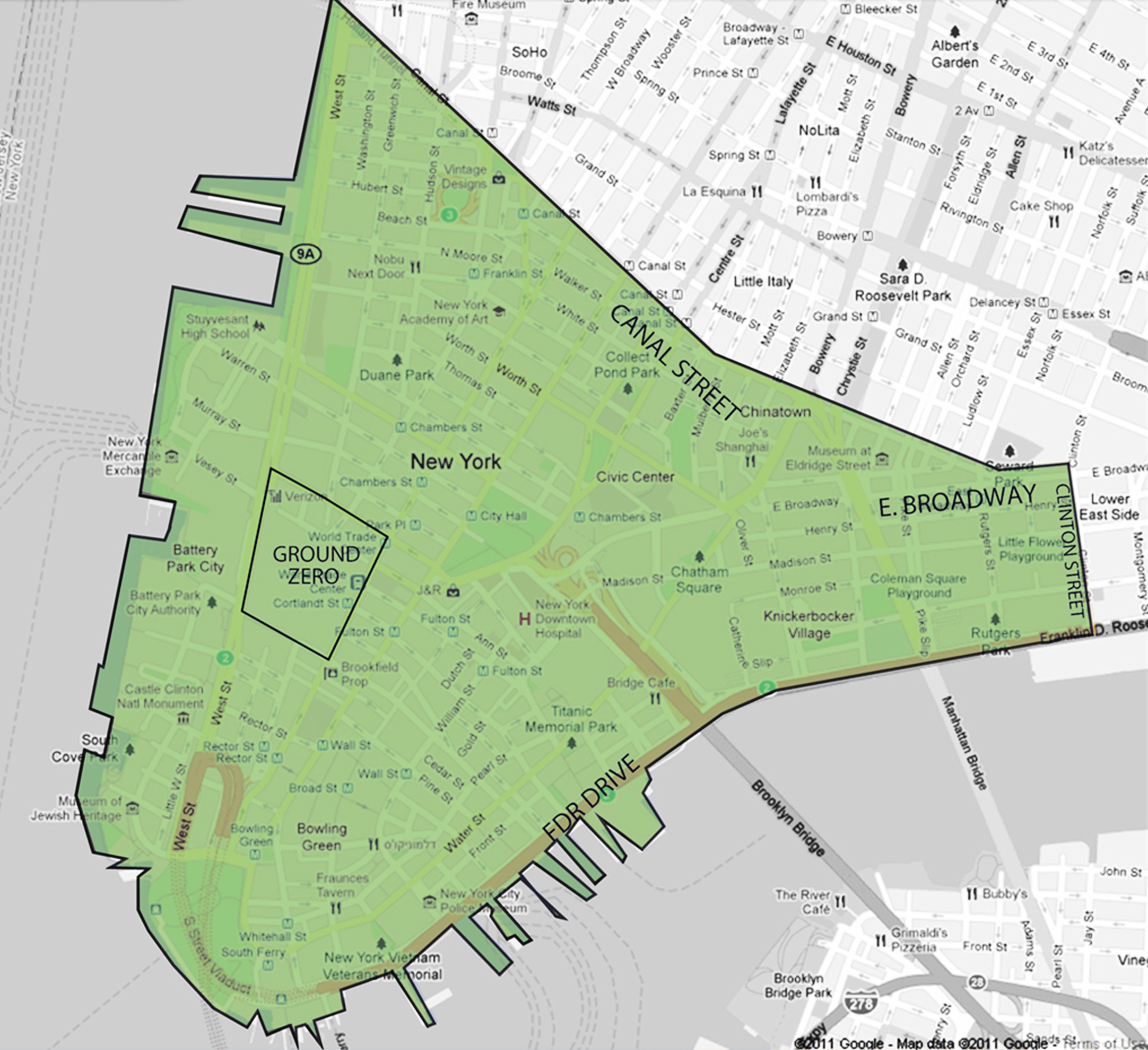Covered Conditions
As a general matter, the VCF will rely on certification by the WTC Health Program that the individual is eligible for treatment for a particular physical injury or condition under the WTC Health Program. By statute, the VCF may not compensate for psychological conditions, but the WTC Health Program provides mental health treatment as part of their healthcare services.
If you developed your 9/11-related physical injury or condition before September 11, 2001 (a “pre-existing” condition), you may still be eligible for compensation if your condition has become more severe since that time and the worsening of the condition is determined by the WTC Health Program to be related to the events of September 11th or the debris removal efforts.
Acute Traumatic Injuries
Acute traumatic injuries are characterized by physical damage to your body caused by hazards or adverse conditions. Examples include:
- Burn
- Complex sprain
- Eye injury
- Fracture
- Head trauma
- Tendon tear
Airway and Digestive Disorders
Airway and digestive disorders, also known as Aerodigestive Disorders, are a group of disorders that affect breathing airways, such as your sinuses or lungs, or upper digestive tract, such as your esophagus. Examples include:
- Asthma
- Chronic cough syndrome
- Chronic laryngitis
- Chronic nasopharyngitis
- Chronic respiratory disorder- fumes and vapors
- Chronic rhinosinusitis
- Gastroesophageal reflux disorder (GERD)
- Interstitial lung disease
- New-onset, and WTC-exacerbated chronic obstructive pulmonary disease (COPD)
- Reactive airway dysfunction syndrome (RADS)
- Sleep apnea (medically associated to another airway or digestive disorder)
- Upper airways hyperreactivity
Cancers
Cancer may be defined as the uncontrolled growth and spread of cells. It may occur at any place in the body, and it makes it difficult for the body to function normally. Examples include:
- Blood and lymphoid tissue (including lymphoma, myeloma, and leukemia)
- Breast
- Childhood cancers
- Digestive system (including colon and rectum)
- Eye and orbit
- Ovary
- Head and neck (oropharynx and tonsil)
- Prostate
- Mesothelioma
- Rare cancers (read a statement from the Administrator about Rare Cancers for more information)
- Respiratory system (including lung and bronchus)
- Skin (melanoma, non-melanoma and carcinoma in situ)
- Soft and connective tissue
- Thyroid
- Urinary system (including kidney and bladder)
- Uterine/Endometrial Cancer (condition added January 2023)
Mental Health Conditions
Mental health conditions include a wide range of conditions that affect your mood, thinking, and behavior.* Examples include:
- Acute stress disorder
- Adjustment disorder
- Anxiety disorders
- Depression
- Dysthymic disorder
- Generalized anxiety disorder
- Major depressive disorder
- Panic disorder
- Post-traumatic stress disorder (PTSD)
- Substance use disorder
* If you did not experience any physical injury or condition as a result of September 11th, but you experienced emotional or mental harm, you are not eligible for compensation from the VCF. The VCF Act explicitly prohibits the VCF from compensating for Mental Health Conditions. As a result, the VCF is not able to accept claims solely for psychological conditions.
The WTC Health Program provides options for treatment of psychological conditions, including post-traumatic stress. For information about whether you may be eligible for WTC Health Program treatment for emotional or mental harms, you may contact them by phone at 1-888-WTC-HP4U (1-888- 982-4748), or on the web at www.cdc.gov/wtc/.
Musculoskeletal Disorders (applies to WTC Responders only)
Musculoskeletal disorders are chronic or recurring disorder of the musculoskeletal system caused by heavy lifting or repetitive strain on the joints. Examples include:
- Carpal tunnel syndrome (CTS)
- Low back pain
- Other musculoskeletal disorders
Maximum Time Interval and Cancer Latency Period
To be certified for some airway and digestive health conditions, your condition must meet an additional requirement known as maximum time interval. Maximum time intervals are the maximum amount of time that could have gone by between the date of your last 9/11 exposure and the onset of symptoms of your airway and digestive health condition. Specific requirements are included in the Member Handbook in the Maximum Time Intervals for Aerodigestive Disorders section.
To be certified for cancer, minimum cancer latency requirements must be met. Latency is the amount of time that has passed between your initial 9/11 exposures and the date you were first diagnosed with cancer. Specific requirements are included in the Member Handbook in the Cancer Latency section.
Eligible Locations
- The World Trade Center site, the Pentagon site, or the Shanksville, Pennsylvania, site.
- The VCF NYC Exposure Zone which consists of the area in Manhattan that runs south of Canal Street, river to river, and from the Hudson River to the intersection of Canal Street and East Broadway, north on East Broadway to Clinton Street, and east on Clinton Street to the East River.
- Any area related to, or along, routes of debris removal, such as barges and the Fresh Kills landfill in Staten Island. The routes of debris removal apply only to those individuals who loaded, unloaded, or drove the trucks containing WTC debris, worked on the barges transporting the debris, and/or worked at the Fresh Kills landfill.
- Any location used by employees of the Office of the Chief Medical Examiner of New York City (“OCME”) involved in the examination and handling of human remains, or locations used by morgue workers who performed similar functions for the OCME staff.
- Any location used for the repair, cleaning, or rehabilitation of vehicles or equipment contaminated by WTC-related debris.
NYC Exposure Zone

Time Frame
To be eligible, individuals must have been present at one of the eligible locations at the time or in the “immediate aftermath” of the September 11th aircraft crashes. The VCF Act defines “immediate aftermath” as “any period beginning with the terrorist-related aircraft crashes of September 11, 2001, and ending on May 30, 2002.” There are no requirements for the minimum amount of time an individual needed to be at a site for purposes of confirming presence. The VCF must apply the time period that Congress established in the VCF Act.